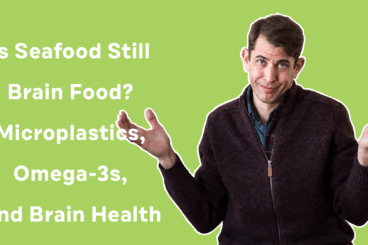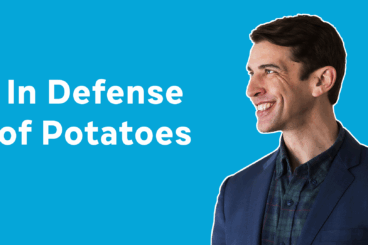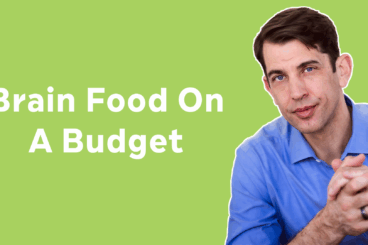Image courtesy Flickr/Dennis Jarvis
In my practice of psychiatric medicine, I spend every day treating patients so that their master mood regulator — the brain — will get more of what it needs to be strong, healthy, and happy.But when I meet new patients, I know that the way most of them eat — the typical American diet of sugars, refined carbohydrates and industrial vegetable fats — does no favors for their mental health. The nation’s epidemic levels of obesity and diabetes have received plenty of news coverage, but rates of brain disorders like depression and dementia are also skyrocketing, and the American diet is partly to blame.
Why? Because so many of the nutrients that the human brain relies upon for its growth, healing and healthy functioning have been stripped from the food supply by modern food processing and factory farming. As a result, we as a nation are overfed and undernourished. We’re also being poisoned. Preservatives, pesticides and plastic packaging have introduced a slew of new chemicals into our systems, which pose additional threats to our brain functions.
Emerging research in the fields of neuroscience and nutrition show that people who eat a diet of modern processed foods have increased levels of depression, anxiety, mood swings, hyperactivity, and a wide variety of other mental and emotional problems. One study found that adolescents with low-quality junk food diets are 79 percent more likely to suffer from depression. Another found that diets high in trans fats found in processed foods raised the risk of depression by 42 percent among adults over the course of approximately six years. And a huge study of women’s diets by the Harvard School of Public health concluded that those whose diets contained the greatest number of healthy omega-3 fats (and the lowest levels of unhealthy omega-6s) were significantly less likely to suffer from depression.
So what to do? Extreme diet recommendations these days run the gamut from veganism to low-fat to low-carb. Without even debating their individual merits, they all share the common problem that they are very restrictive and very hard to stick to. As a physician, I know all too well that strict regimens of any kind are almost always doomed to failure and then often leave people feeling worse off than before. That’s why the best prescriptions are often those that are simple and easiest to follow. With that thought in mind, here are the five basic rules I give to patients, friends, and family who want to simplify their choices at mealtime and maximize their brain health.
1. Skip the processed foods.
Processed foods are filled with empty calories, which is why so many people who count calories for weight loss end up with nutritional deficiencies that affect their energy levels, moods and thought processes. Brain-healthy nutrients are found in whole foods such as seafood (vitamin B-12, omega-3 fats), leafy greens and lentils (folates and magnesium), whole grains and nuts (certain forms of vitamin E that protect brain fat), and tomatoes and sweet potatoes (top sources of lycopene and other carotenoids, fat soluble antioxidants that decrease inflammation). Once you start eating a plant-based diet of nutrient-dense, whole foods, your moods will level out, your blood sugar will stop spiking and crashing, and your thinking will get clearer. You will see that food is much more than just fuel for your day.
2. Go organic.
Many insecticides and pesticides are neurotoxins, and although some claim the science isn’t settled about their health risks, remember that the same was said about cigarettes for decades before their dangers were officially recognized. Organic food usually costs a little more, so it’s smart to start by switching to organic apples, celery, peaches and other produce that normally rank highest in contaminants. For a full list, check out the Environmental Working Group’s “dirty dozen.” Availability also used to be a problem with organics, but no more. Supermarkets are steadily increasing their organic offerings, and the spread of farmers markets around the U.S. has added further reach for the movement.
3. Don’t fear fats.
Trans fats still found in many packaged baked goods are among the unhealthiest substances around, which is another good reason to stay away from processed foods. But the omega-3 fats DHA and EPA, which are found in whole foods like fish, seafood, and in smaller amounts in grass-fed meat and dairy products and pasture-raised eggs, are great for your brain. One researcher calls them “nutritional armor.” Studies show that these two fats help protect your brain against mood disorders, while low levels of DHA have been associated with increased risk of suicide. And these fats don’t make you fat! In fact, foods with healthy fats help you feel satiated, so you end up eating less.
4. Mind your meat.
Meat is brain food. Along with other animal products like seafood, eggs and dairy, the right meat is a protein-rich source of omega-3 fats DHA and EPA and another fat, CLA, which is associated with fighting cancer and reducing levels of deadly abdominal fat. A plant-based diet is essential for brain health, but a diet completely free of animal products has its own problems. It forces one to take nutritional supplements, which are expensive and aren’t always absorbed sufficiently in the body. Deficiencies of vitamin B12 are particularly common among those who adhere to a vegan diet, which puts some at risk of irreversible brain and nerve damage. Not all meat is created equal, though. “Grass-fed” or “pasture-raised” beef and chicken have more beneficial nutrients in them and are free antibiotics and harmful hormones fed to factory farmed animals. Eggs that are “farm fresh” have higher nutritional value because they were laid by hens with a healthier natural diet.
5. Make friends with farmers.

On Friday, July 27, @HealthyLiving and @ColumbiaMedNews hosted a Twitter chat — #foodandmood. Check out an archive here.
Correction: A previous version of this post stated the omega-3 fats DHA and EPA are found in foods like butter, yogurt and full-fat milk. They are found in foods like fish, seafood, and in smaller amounts in grass-fed meat and dairy products and pasture-raised eggs.




Wonderful! You mention the huge study of women looking at omega 3 and decreased depression. Is this the same for women and postpartum depression? It stands to reason that it is. I’m curious if you can speak to anything different, the same, more true or unique that women concerned with preventing or treating postpartum depression need to know? Thank you!
The research is a bit mixed but overall it seems that increasing long-chained omega-3 fat (EPA and DHA) intake can decrease the risk of postpartum depression. Along with omega-3s, a more nutrient dense diet, exercise, mindfulness work and a supportive group of peers are all great ways to also help decrease depression risk.
Thanks! Great info! More please!
Good morning Dr Ramsey:
I heard your program with Joy Cardin this morning on NPR and was wondering …what is the name of the new book and when will it come out? Thanks!
Hi Kari – Thanks for the comment and happy you heard the show! Eat Complete is out May 17 but you can pre-order now. When it comes out, reviews on Amazon or other bookseller sites are really really appreciated! Thanks
https://www.amazon.com/Eat-Complete-Nutrients-Brainpower-Transform/dp/0062413430/ref=sr_1_1?s=books&ie=UTF8&qid=1457034789&sr=1-1&keywords=eat+complete
I just heard you on Splendid Table and I really look forward to reading your book. I read the recommendation on your website about fermented foods. I get a stomach ache when I eat fermented foods. I’m in my mid-50s and lots of things that didn’t bother me when I was younger are starting to cause my stomach to ache. Do you have any thoughts about something else I could eat or not eat to help me better tolerate fermented foods? Or, are some people just unable to tolerate fermented foods (and if it hurts, stop eating it!)? Thank you!
Very informative!
I also just heard your interview on Splendid Table. For years I have intuitively known bulking up with supplements wasn’t the answer to everything. Thank you for having the credentials, heart and knowledge to connect the foods we eat with our growing mental health issues which correlate to increases in “synthetic” diet. I am 70 with difficulties achieving restful sleep (this, on a daily basis). Any suggestions?
Janet